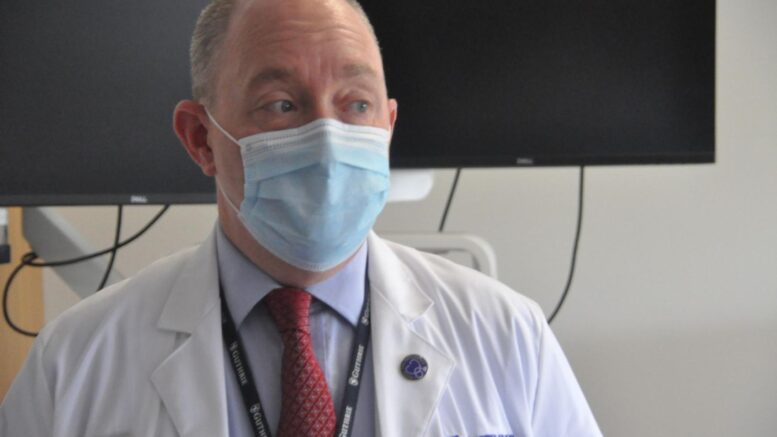As many parents get ready to send their children back to the classroom in the midst of the COVID-19 pandemic, Guthrie Pediatrics System Chief Dr. Philip Heavner said keeping kids safe is a lot about common sense.
Speaking as part of a press event Tuesday at the Guthrie Robert Packer Hospital, Heavner urged parents to thoroughly read their school district’s health and safety plan, including contingency plans, before sending their children back into the classroom. He also said regular hand washing, mask wearing, and social distancing are key to keeping kids safe throughout the day.
“Kids should absolutely be wearing masks,” he stressed. “There are very few exceptions to that. Children under 2 shouldn’t wear masks. Children who have breathing difficulties due to some medical issue or people who can’t remove a mask on their own safely probably shouldn’t be wearing a mask. But those folks are going to need notes from their medical providers.”
Although some might be concerned about children picking up the virus on their clothes, Heavner pointed out that there is little evidence to support that. However, the medical community has been concerned about the possibility of children becoming infected with both COVID-19 and another virus such as influenza.
“We’ve always known that school aged children are a repository for respiratory illness and things like that,” said Heavner. “What leaps to mind is influenza, and that’s one reason why we’re such proponents for things such as influenza vaccine, which is going to be especially important this year. We’re aware that co-infections with things like influenza and other respiratory viruses and coronavirus could be potentially very bad.”
He said school vaccine requirements in both Pennsylvania and New York state already establish a safeguard for protecting children from illnesses that can be avoided.
As school districts rely on parents to make sure their kids are healthy before going to school, Heavner said temperature checks aren’t needed unless a child isn’t feeling well.
“If they have a 100.4 or higher, they should really stay home and possibly be evaluated by their health care provider,” he said.
Testing is also only needed in the case a child shows symptoms, especially given some of the lengthy wait times with current testing and the fact that the U.S. doesn’t have a universal testing system in place like some other countries, he added.
While area school districts have consulted with Guthrie as they’ve crafted their health and safety plans, Heavner noted that he wasn’t involved in those discussions, so he couldn’t speak specifically to what was detailed as part of that process. However, there are regular discussions going on internally “and we’re being as consistent with our advice as we possibly can.”
He stressed that in-person learning is safe given the current low levels of infection locally, and officials are continuing to monitor the spread of the virus day by day. Referencing a statement from the American Academy of Pediatrics, Heavner noted that in-person learning is more beneficial than virtual options for a variety of reasons, including the development of social/emotional skills, nutrition and physical activity, and mental health support.
“If there’s going to be in-person learning, there’s always going to be the risk of transmissible disease,” he explained. “The question is how serious is that disease and how is it going to affect people? Coronavirus is just a next level illness. It’s something that, at this point, we don’t have a good vaccine for but we will. We basically have to get from here to there, and we’re all hoping it’s a matter of months. So it’s really about getting things right this fall, preparing for contingencies when things do come up, and getting appropriate medical treatment when they do.”



Be the first to comment on "Hand washing, masks, social distancing, and common sense"